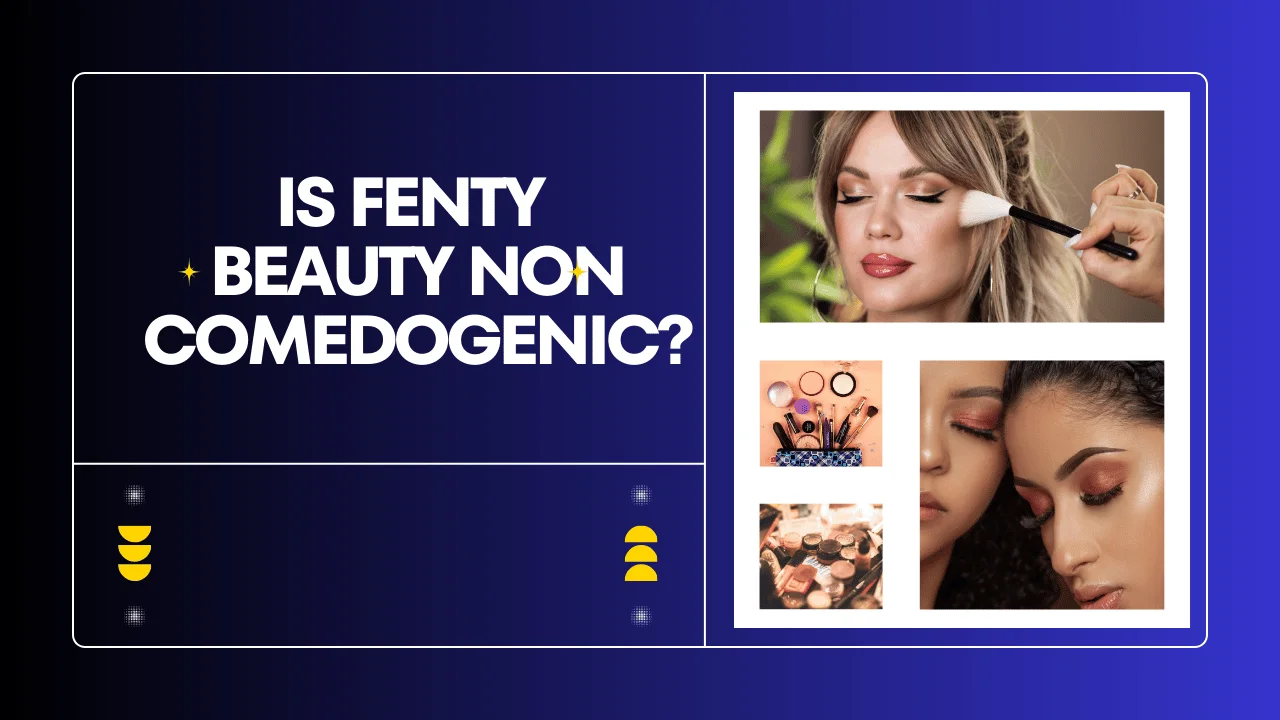Ever stared longingly at a flawless foundation ad, only to have your acne-prone skin scream in protest?
We’ve all been there – dreaming of flawless coverage without the dreaded breakout brigade. Enter Fenty Beauty, a brand lauded for its inclusivity and impressive range. But what if the key to achieving flawless skin lies not in the brand name, but in the formula itself?
Here’s the burning question for all our acne warriors out there: is Fenty Beauty truly a non-comedogenic haven, or is it just clever marketing?
Non-comedogenic makeup is a holy grail for those of us battling breakouts. These products are formulated to minimize the risk of clogging pores, the main culprit behind pimples and blackheads. But with so much conflicting information out there, deciphering whether a product is truly non-comedogenic can feel like a beauty battlefield.
Fear not, fellow makeup enthusiasts! In this deep dive, we’ll dissect Fenty Beauty’s ingredients, analyze user experiences, and compare them to industry standards. Buckle up, because we’re about to uncover the truth behind Fenty Beauty’s non-comedogenic claims and help you decide if it’s the key to unlocking your breakout-free future.
Contents
- 1 Fenty Beauty’s Official Stance
- 2 Defining Non-Comedogenic
- 3 Analyzing Fenty Beauty’s Ingredients
- 4 User Experiences and Testimonials
- 5 Comparison with Other Brands
- 6 Conclusion
- 7 FAQ’s
- 7.1 Are all Fenty Beauty products non-comedogenic?
- 7.2 What are the main ingredients in Fenty Beauty products that make them suitable for acne-prone skin?
- 7.3 Can I trust the marketing claims made by Fenty Beauty regarding its non-comedogenic products?
- 7.4 Are there any known ingredients in Fenty Beauty products that could potentially cause breakouts?
- 7.5 How can I determine if a Fenty Beauty product is right for my skin?
- 7.6 Are there any alternatives to Fenty Beauty for those with acne-prone skin?
Fenty Beauty’s Official Stance
Fenty Beauty has made significant efforts to cater to a diverse range of skin types, including those with acne-prone skin.
While the brand may not have explicitly stated all of its products as non-comedogenic, their marketing materials often highlight the lightweight, breathable texture and seamless blendability of their formulations.
These characteristics can be indicative of a product’s suitability for acne-prone skin, as they minimize the risk of clogging pores.
It’s important to note that while Fenty Beauty hasn’t explicitly labeled all its products as non-comedogenic, the brand’s focus on inclusivity and catering to various skin concerns suggests a commitment to creating products that are gentle and suitable for a wide range of individuals, including those with acne-prone skin.
Defining Non-Comedogenic
In the realm of cosmetics, the term “non-comedogenic” refers to products that are formulated to minimize the risk of clogging pores. These products are designed to be gentle on the skin and less likely to contribute to acne breakouts.
Key criteria for a non-comedogenic product include:
- Reduced likelihood of clogging pores: A non-comedogenic product should not contain ingredients that are known to clog pores and contribute to acne.
- Suitable for acne-prone skin: These products are specifically formulated to be gentle on sensitive or acne-prone skin, avoiding ingredients that can exacerbate breakouts.
- Free from ingredients known to cause breakouts: Non-comedogenic products should be free from ingredients like lanolin, coconut oil, and certain types of wax, which are commonly known to be comedogenic.
By understanding these essential elements, consumers can make informed choices when selecting products that are less likely to contribute to acne and breakouts.
Analyzing Fenty Beauty’s Ingredients
To determine whether Fenty Beauty’s products are non-comedogenic, it’s essential to meticulously examine the specific ingredients listed on the product packaging.
While the brand may not explicitly state all of its products as non-comedogenic, analyzing the ingredients can provide valuable insights.
By carefully scrutinizing the ingredient list, you can identify any potentially comedogenic ingredients that are known to contribute to clogged pores. It’s important to consult reliable sources and refer to comedogenic ratings of individual ingredients. These ratings assess the likelihood of an ingredient causing comedones (pimples or blackheads).
While some ingredients may be naturally comedogenic, their role in the overall formulation can also influence their potential to clog pores. For example, an oil-based foundation may be more likely to clog pores than a water-based foundation, even if it contains non-comedogenic oils.
By understanding the interplay of ingredients and their potential comedogenic properties, you can make more informed decisions about whether Fenty Beauty’s products are suitable for your skin.

User Experiences and Testimonials
While Fenty Beauty may not explicitly label all of its products as non-comedogenic, firsthand accounts and consumer reviews can provide valuable insights into the brand’s suitability for acne-prone skin.
Many individuals with acne-prone skin have shared positive experiences with Fenty Beauty products, reporting that they have not caused breakouts or worsened their skin conditions.
By reading online reviews and testimonials, you can gain a better understanding of how Fenty Beauty products have worked for others with similar skin types.
While individual experiences may vary, these accounts can provide valuable information and help you make an informed decision about whether Fenty Beauty is a suitable option for your skin.
Comparison with Other Brands
To gain a broader perspective on Fenty Beauty’s commitment to non-comedogenic products, it’s helpful to compare its practices to other well-known brands in the beauty industry. Many reputable brands have explicitly labeled their products as non-comedogenic, adhering to strict guidelines and certifications.
By comparing Fenty Beauty to these brands, you can assess whether the brand’s practices align with industry standards and expectations for non-comedogenic products. Additionally, it’s important to be aware of any notable exceptions or controversies within the beauty industry related to non-comedogenic claims.
Some brands may have faced criticism or allegations that challenge their claims of being non-comedogenic. By staying informed about these exceptions, consumers can make more informed decisions when choosing products for acne-prone skin.
Conclusion
Based on the evidence presented, while Fenty Beauty hasn’t explicitly labeled all of its products as non-comedogenic, the brand’s commitment to inclusivity, its use of lightweight and breathable formulas, and the positive feedback from users suggest that many of its products are suitable for acne-prone skin.
Key points discussed in this article include Fenty Beauty’s official stance, the definition of non-comedogenic, an analysis of the brand’s ingredients, user experiences and testimonials, comparisons with other brands, and considerations for individual skin needs.
While Fenty Beauty may be a good option for many individuals with acne-prone skin, it’s essential to remember that individual skin reactions can vary.
It’s recommended to research other non-comedogenic brands and consult with a dermatologist to determine the best products for your specific skin type and concerns.
By considering these factors and making informed choices, you can find the perfect makeup products to achieve a clear and healthy complexion.
FAQ’s
Are all Fenty Beauty products non-comedogenic?
While many Fenty Beauty products are considered suitable for acne-prone skin, it’s important to check the specific product descriptions and ingredient lists for individual items. Some formulations may be more likely to cause breakouts than others.
What are the main ingredients in Fenty Beauty products that make them suitable for acne-prone skin?
Fenty Beauty often uses lightweight, breathable formulas that are less likely to clog pores. Ingredients like hyaluronic acid, which helps to hydrate the skin without clogging pores, can be beneficial for acne-prone skin. However, it’s essential to analyze the specific ingredients in each product to determine its suitability for your skin.
Can I trust the marketing claims made by Fenty Beauty regarding its non-comedogenic products?
While Fenty Beauty may make claims about its products being suitable for acne-prone skin, it’s always recommended to do your own research and consider the specific ingredients and user experiences.
Are there any known ingredients in Fenty Beauty products that could potentially cause breakouts?
While Fenty Beauty generally avoids using ingredients known to be highly comedogenic, it’s always a good idea to check the ingredient list of individual products. Some ingredients, such as certain oils or waxes, can be more likely to clog pores.
How can I determine if a Fenty Beauty product is right for my skin?
The best way to determine if a Fenty Beauty product is suitable for your skin is to patch test it on a small area of your face. Pay attention to any signs of irritation, redness, or breakouts. Additionally, consider your skin type and specific concerns to choose the right product for your needs.
Are there any alternatives to Fenty Beauty for those with acne-prone skin?
There are many other beauty brands that offer non-comedogenic products. It’s recommended to research and compare different options to find the best product for your skin.








